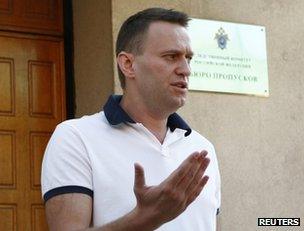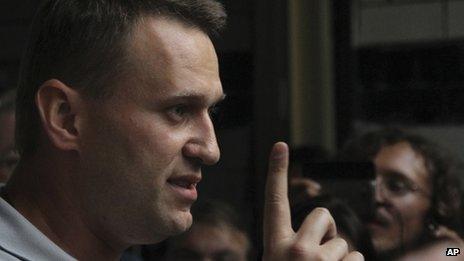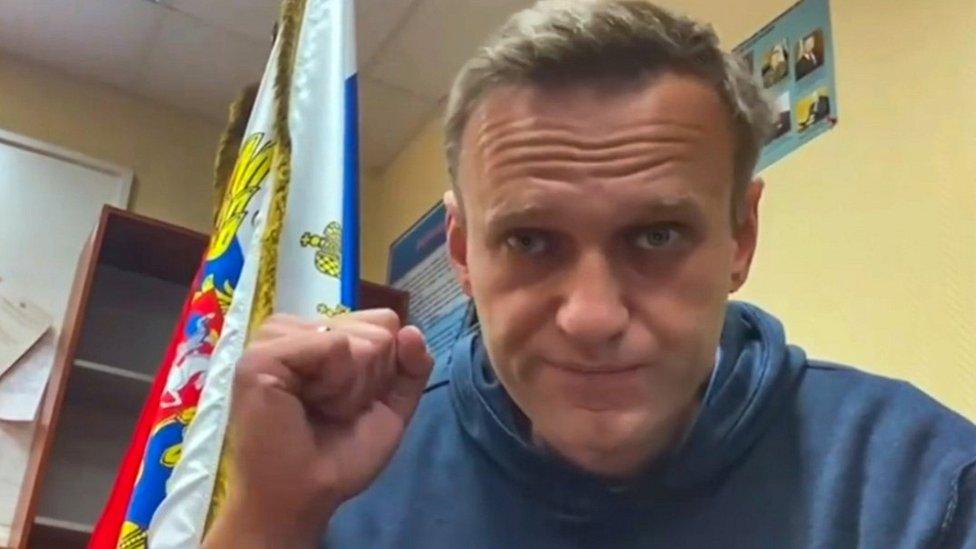Russian blogger Navalny charged with embezzlement
- Published

Alexei Navalny is one of Russia's most influential opposition leaders
Russian anti-corruption campaigner Alexei Navalny has been charged with embezzlement in a case he describes as "strange and absurd".
Federal investigators in Moscow brought charges over a timber deal in the Kirov region in which he was involved as an unofficial adviser three years ago.
The case was previously investigated and dropped by regional prosecutors.
Mr Navalny, who was also ordered not to leave the country, suggested the new charges were aimed at discrediting him.
Supporters of the anti-corruption lawyer, who led mass protests in Moscow against Russian leader Vladimir Putin this winter, demonstrated outside the offices of the Investigative Committee (SK) in Moscow, where he was charged on Tuesday.
Under Article 160 of the Russian criminal code, external on "misappropriation or embezzlement", Mr Navalny faces between five and 10 years in prison if convicted.
Reacting to news of the case, Swedish Foreign Minister Carl Bildt said on Twitter, external: "We should be concerned with attempts in Russia to silence fierce opposition activist Alexei @navalny."
New accusation
The original case related to a loss-making contract concluded by a state-owned timber company in Kirov, a region just west of the Ural Mountains, with another company.
The Kirov regional budget for 2009-10 reportedly suffered a loss of 1.3m roubles (£26,000; $40,000) and Mr Navalny was investigated as he was acting at the time as an adviser to Kirov's governor, Nikita Belykh.
Federal investigators initially sought to charge Mr Navalny with causing "damage to property by means of deceit or abuse of trust" but they proceeded to more serious charges after reviewing the evidence, SK spokesman Vladimir Markin told reporters.
The new charges were posted on the website of the SK, a federal body set up to act as the equivalent of the FBI in Russia.
Mr Navalny is now accused of colluding with the heads of the two companies involved to organise the theft of timber worth 16m roubles (£300,000; $500,000).
The anti-corruption campaigner pointed out that he had gone to the SK expecting to be charged with the lesser offence, only to find the case had been altered against him into something much more serious.
"This charge is strange and absurd," he said after emerging from the building. "They have completely changed the essence of the charge."
"This is a mega-strange thing," he added. "Even the very figure of 16m roubles has not been explained at all."
Crackdown
This winter saw the biggest anti-government demonstrations in Moscow since the fall of the USSR. Protesters rallied around Mr Navalny, who accused Mr Putin's allies of rigging elections.
Since Mr Putin was re-elected president in March, legal action against opposition figures has increased markedly. A tough new law was passed on public order offences and tight curbs were placed on non-governmental organisations.
In recent weeks, Mr Navalny, a lawyer by training, turned his fire on the SK's chief, Alexander Bastrykin, reports the BBC's Moscow correspondent, Daniel Sandford.
Mr Bastrykin denied Mr Navalny's allegations that he had undeclared business interests in the Czech Republic.
He admitted once owning a flat there but said he had given it to his first wife. As for commercial activity, he said: "I was never in business. Business in the sense of aiming to make a profit. If they can find a single euro in profit, I'll resign."
Mr Navalny vowed on Tuesday to continue his political activities despite the case against him.
"I will continue doing what I did before - nothing has changed for me," he was quoted as saying by AFP news agency.
- Published13 July 2012

- Published16 February 2024
